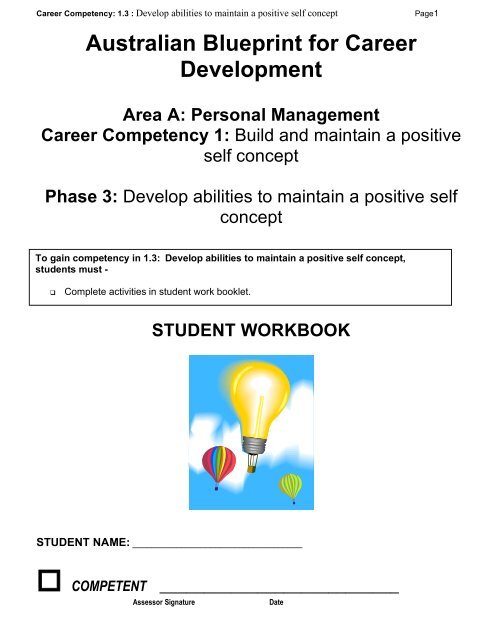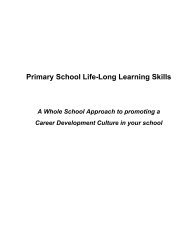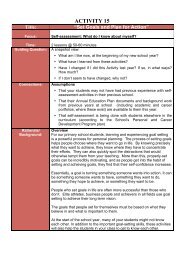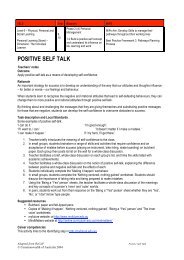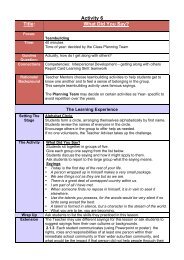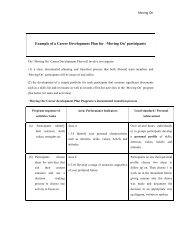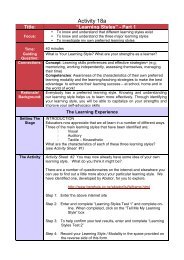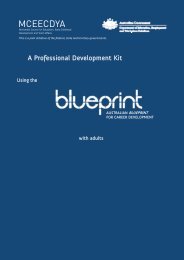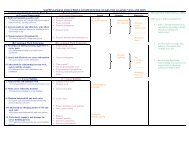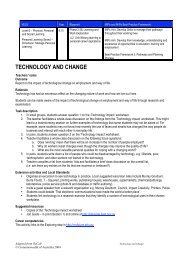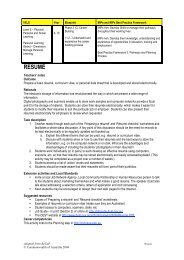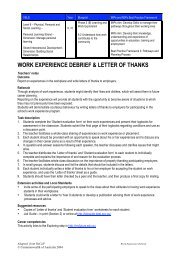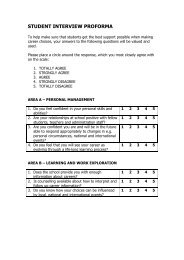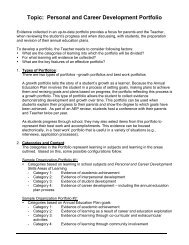Area A 1.3 workbook - Blueprint - Australian Blueprint for Career ...
Area A 1.3 workbook - Blueprint - Australian Blueprint for Career ...
Area A 1.3 workbook - Blueprint - Australian Blueprint for Career ...
You also want an ePaper? Increase the reach of your titles
YUMPU automatically turns print PDFs into web optimized ePapers that Google loves.
<strong>Career</strong> Competency: <strong>1.3</strong> : Develop abilities to maintain a positive self concept Page1<br />
<strong>Australian</strong> <strong>Blueprint</strong> <strong>for</strong> <strong>Career</strong><br />
Development<br />
<strong>Area</strong> A: Personal Management<br />
<strong>Career</strong> Competency 1: Build and maintain a positive<br />
self concept<br />
Phase 3: Develop abilities to maintain a positive self<br />
concept<br />
To gain competency in <strong>1.3</strong>: Develop abilities to maintain a positive self concept,<br />
students must -<br />
Complete activities in student work booklet.<br />
STUDENT WORKBOOK<br />
STUDENT NAME: ___________________________________<br />
COMPETENT ___________________________<br />
Assessor Signature Date
<strong>Career</strong> Competency: <strong>1.3</strong> : Develop abilities to maintain a positive self concept Page2<br />
CAREER COMPETENCIES AND PERFORMANCE INDICATORS FOR<br />
PHASE III<br />
AREA A: Personal management<br />
COMPETENCY 1: Build and maintain a positive self concept<br />
Phase III Develop abilities to maintain a positive self concept<br />
Per<strong>for</strong>mance Indicators:<br />
<strong>1.3</strong>.1 Understand how individual characteristics such as interests, skills, values, beliefs and<br />
attitudes contribute to achieving personal, social, educational and professional goals<br />
<strong>1.3</strong>.2 Understand the importance of giving and receiving feedback to maintaining a positive self<br />
concept<br />
<strong>1.3</strong>.3 Understand the importance of allies (e.g., friends and supporters) to maintaining a positive<br />
self concept<br />
<strong>1.3</strong>.4 Identify your personal characteristics such as interests, skills, values, beliefs and attitudes<br />
<strong>1.3</strong>.5 Identify behaviours and attitudes that reflect your self concept<br />
<strong>1.3</strong>.6 Identify your allies and external assets<br />
<strong>1.3</strong>.7 Demonstrate giving and receiving feedback in ways that build a positive self concept<br />
<strong>1.3</strong>.8 Assess how your personal characteristics and behaviours are reflected in your life, learning<br />
and work goals<br />
<strong>1.3</strong>.9 Assess the part that your allies play in achieving your life, learning and work goals<br />
<strong>1.3</strong>.10 Assess your personal characteristics and capitalise on those that contribute positively<br />
to the achievement of personal, educational, social and professional goals<br />
<strong>1.3</strong>.11 Adopt behaviours and attitudes that will help you reach your life, learning and work goals
<strong>Career</strong> Competency: <strong>1.3</strong> : Develop abilities to maintain a positive self concept Page3<br />
Per<strong>for</strong>mance Indicator: <strong>1.3</strong>.1 Understand how individual characteristics such as interests, skills, values,<br />
beliefs and attitudes contribute to achieving personal, social, educational and professional goals<br />
Background:<br />
Your personal qualities, your values and your interests can all help you work out what you want your<br />
direction in life to be and what your goals are.<br />
When you set your goals, make sure they are realistic, achievable, measurable and specific.<br />
Activity: Personal Qualities, Interests and Goals<br />
Step 1:<br />
To help you identify your personal qualities you need to look at the following list. Highlight those<br />
words that you think best describe you.<br />
Active Affectionate Ambitious Artistic Athletic<br />
Caring Cheerful Confident Considerate Creative<br />
Curious Decisive Determined Emotional Energetic<br />
Enthusiastic Extroverted Faithful Flexible Focused<br />
Friendly Generous Gentle Happy Healthy<br />
Honest Humane Humorous Industrious Intelligent<br />
Interesting Introverted Kind Lazy Logical<br />
Loner Loving Loyal Methodical Musical<br />
Open-minded Passionate Patient Pensive Perfectionist<br />
Persistent Persuasive Positive Reliable Resourceful<br />
Respectful Risk-taker Sensitive Smart Sociable<br />
Talkative Thoughtful Tolerant Truthful Trustworthy<br />
Now you have a list of personal qualities that describe some aspects of who you are. This can help<br />
you decide on the types of jobs that may suit you.<br />
Step 2:<br />
Your interests can give you an insight into the type of career that would appeal to you. What are<br />
your interests? Ask yourself what you like doing. What are your hobbies? What subjects do you<br />
enjoy? What do you do in your spare time? Do you like being with people? Do you like being inside<br />
or outside? Are you active or passive?<br />
Highlight the interest areas that fit you.<br />
How things work Living things<br />
The human body Sport<br />
Computers and technology Building things<br />
Animal care Helping people<br />
The environment – earth, plants, trees Art – drawing, painting sculpting<br />
Fashion Books, literature, writing<br />
Music, dance, per<strong>for</strong>ming, acting Talking to people<br />
This list can help you set your goals and future career choices.
<strong>Career</strong> Competency: <strong>1.3</strong> : Develop abilities to maintain a positive self concept Page4<br />
Step 3:<br />
One way to identify your goals is to look at what your needs and wants are. Needs are essentials,<br />
such as food, shelter, clothing. Wants are very individualistic and cover all of the extras like<br />
holidays, entertainment system etc.<br />
What are your goals? Include personal, social, educational and professional goals. Use a pencil as<br />
your goals can change!<br />
Personal:_______________________________________________________________________<br />
_______________________________________________________________________________<br />
Social:__________________________________________________________________________<br />
_______________________________________________________________________________<br />
Educational:_____________________________________________________________________<br />
_______________________________________________________________________________<br />
Professional:_____________________________________________________________________<br />
_______________________________________________________________________________<br />
Step 4:<br />
Now, have a look at the highlighted list of personal qualities, interests you have as well as the goals<br />
you have written. For each goal, match it to your personal qualities and interests.<br />
GOALS PERSONAL QUALITIES INTERESTS<br />
Remember, if you want to make your goals happen, they must be realistic, achievable,<br />
measurable and specific.
<strong>Career</strong> Competency: <strong>1.3</strong> : Develop abilities to maintain a positive self concept Page5<br />
Per<strong>for</strong>mance Indicator: <strong>1.3</strong>.2 Understand the importance of giving and receiving feedback to maintaining<br />
a positive self concept<br />
Per<strong>for</strong>mance Indicator: <strong>1.3</strong>.7 Demonstrate giving and receiving feedback in ways that build a positive self<br />
concept<br />
Background in<strong>for</strong>mation: Tips <strong>for</strong> Giving and Receiving Feedback<br />
• Giving and receiving feedback is a great way <strong>for</strong> you to improve your understanding of how<br />
people interact and communicate with each other<br />
• A lot of people find communicating well does not come naturally<br />
• Be patient!<br />
• The more you practice, you should find that you can give and receive feedback more openly and<br />
more constructively<br />
• Giving and receiving feedback should be based on trust, honesty, and truthfulness<br />
Giving Feedback- DOs and DONT’S<br />
DO<br />
• Describe the behaviour, not the person<br />
• Speak <strong>for</strong> yourself only and restrict your feedback to things you know <strong>for</strong> certain<br />
• Choose an appropriate time and place<br />
• Your only motive should be to be helpful<br />
• Focus on recent behaviour- don’t get hung up on the past<br />
• Check with the other person that they have understood your feedback and taken it in the way<br />
you intended<br />
DON’T<br />
• Don’t use labels<br />
• Don’t judge or be judgmental<br />
• Don’t exaggerate<br />
• Don’t overload the other person by giving them too much in<strong>for</strong>mation<br />
Receiving Feedback<br />
• Listen Carefully<br />
• Avoid becoming defensive and over-reacting<br />
• Take note of any questions or disagreements<br />
• Restate what you think you hear<br />
• Ask questions to clarify and restate again<br />
• Ask <strong>for</strong> examples and restate again<br />
• Acknowledge valid points<br />
• Acknowledge feedback<br />
• Take time to understand and sort out what you have heard<br />
• Gather more in<strong>for</strong>mation from other sources and/or by observing your own behaviour and<br />
reactions to it<br />
• When appropriate modify your behaviour and evaluate the outcome<br />
Personal and Result Orientated Feedback
<strong>Career</strong> Competency: <strong>1.3</strong> : Develop abilities to maintain a positive self concept Page6<br />
Sometimes it is more appropriate in providing feedback to focus on the impact that a person’s<br />
actions or words are having on you. Some examples of this approach are:<br />
• When you ……….. (action)<br />
• I feel …….. / The results or consequences are ……… (impact)<br />
• I’d prefer ……… / What would be more effective ………. (alternative action)<br />
• This would mean ……….. (results of alternative action)<br />
• And the improved results or consequences would be ………..(results of alternative action)<br />
Activity:<br />
Work in threes (#1 is the manager, #2 is the employee, and #3 is the scrutineer who checks<br />
that the Do’s and Don’t are effectively covered )<br />
The scenario:<br />
You are a manager at a local video store. You have noticed that one of your staff seems to be<br />
taking longer <strong>for</strong> her breaks, arriving back on average 5 minutes late <strong>for</strong> the last 3 days. You have<br />
also noticed that lately she doesn’t use her time effectively when business is slow. The expectation<br />
is that videos and DVD’s are returned to the shelves as soon as they have been checked in and<br />
that the shelves are tidied up. This hasn’t been happening. You call her aside….<br />
Scenario 2: Make up another scenario where feedback is given and received, and swap roles. It is<br />
important that each person in the group has the chance to take on each role.
<strong>Career</strong> Competency: <strong>1.3</strong> : Develop abilities to maintain a positive self concept Page7<br />
Per<strong>for</strong>mance Indicator: <strong>1.3</strong>.3 Understand the importance of allies (e.g., friends and supporters) and to<br />
maintaining a positive self concept<br />
Per<strong>for</strong>mance Indicator: <strong>1.3</strong>.6 Identify your allies and external assets<br />
Activity: Allies and Assets – significant influences<br />
As individuals, our life choices and decisions are often shaped by the people around us and also by<br />
major events. Family and friends can be powerful influences and allies on career decisions. How<br />
many children have followed in their parents footsteps and taken up similar careers?<br />
The communities in which we are brought up, the educational experiences that we have been<br />
exposed to influence and shape our ideas about the kind of people we can become and the nature<br />
of our working futures.<br />
Your Job: Try and identify the people and events that have had a significant influence on your<br />
career thinking. Try to recognise whether any future decision you make is wholly yours or whether<br />
you are trying to please someone else…<br />
1. How did your family background influence your idea of what work could be? (Consider also<br />
your family’s perception of the costs of training in your response.)<br />
____________________________________________________________________________<br />
____________________________________________________________________________<br />
____________________________________________________________________________<br />
____________________________________________________________________________<br />
2. What did your background tell you about jobs which were acceptable or not acceptable?<br />
____________________________________________________________________________<br />
____________________________________________________________________________<br />
____________________________________________________________________________<br />
____________________________________________________________________________<br />
3. What perceptions does your present circle of friends and acquaintances have about work,<br />
and also the type of work they think is suitable <strong>for</strong> you?<br />
____________________________________________________________________________<br />
____________________________________________________________________________<br />
____________________________________________________________________________<br />
____________________________________________________________________________<br />
4. How has your experience of education shaped your ideas about the kinds of work that are<br />
acceptable?<br />
____________________________________________________________________________<br />
____________________________________________________________________________<br />
____________________________________________________________________________<br />
____________________________________________________________________________
<strong>Career</strong> Competency: <strong>1.3</strong> : Develop abilities to maintain a positive self concept Page8<br />
Per<strong>for</strong>mance Indicator: <strong>1.3</strong>.5 Identify behaviours and attitudes that reflect your self concept<br />
Activity: Behaviours and attitudes and self concept<br />
Purpose: To help students develop self-awareness by<br />
1. identifying behaviours and attitudes that mirror their self concept.<br />
2. describing the characteristics (behaviours and attitudes) of their peers.<br />
Structure: Divide class into groups of 5 or 6.<br />
Resources: Small pieces of paper, large enough to write a phrase on each. At least 10 pieces per<br />
student.<br />
Instructions: Ask each student to describe the 5 other people in their group using very brief<br />
descriptions (one sentence or a brief phrase). The descriptions are to focus on the<br />
student’s attitudes and behaviour. Write at least two of these <strong>for</strong> each person, each on<br />
a separate piece of paper.<br />
Descriptions are to be positive only (no put downs).<br />
Put all pieces of paper in the middle of the group, and ask each person to sort through<br />
and find three descriptions that they think fit them best.<br />
Each person reads out the descriptions they have chosen and explains why they have<br />
chosen them.<br />
Allow time <strong>for</strong> students to record these as part of their personal profile.<br />
Extension: Each student reads the descriptions they have written about the other students and<br />
explains why they wrote them.<br />
Guidelines: Have a list of descriptions to select from if you feel your class will not be able to think<br />
of their own e.g., “Able to work effectively in a team”, “Shows initiative” etc. SEE THE<br />
“WHAT I CAN DO” LIST in the Appendix<br />
Credit: Adapted from Peter Speers - <strong>Career</strong> Services Rapuara, NZ
<strong>Career</strong> Competency: <strong>1.3</strong> : Develop abilities to maintain a positive self concept Page9<br />
Per<strong>for</strong>mance Indicator: <strong>1.3</strong>.5 Identify your personal characteristics such as your interests, skills, values,<br />
beliefs and attitudes<br />
Activity: My personal characteristics<br />
PartA: Complete the following per<strong>for</strong>mance preference profile.<br />
Group Behaviour<br />
I like to accept a challenge<br />
I like to manage a project<br />
I like to assist people<br />
I like to coach people<br />
I like to demonstrate things<br />
I like to change procedures<br />
I like to be creative<br />
I like to entertain people<br />
I like to gather in<strong>for</strong>mation<br />
I like to handle details<br />
I like to help others<br />
I like to repair things<br />
I like to organise events<br />
I like to persuade people<br />
I like to sell ideas<br />
I like to solve problems<br />
I like to see the ‘big picture’<br />
I like to work on my own<br />
This is like me<br />
This is NOT like<br />
me<br />
B Summarise what you have discovered about yourself and decide whether you are more of a<br />
leader or team member. You will need to discuss your findings with your classmates to get<br />
their opinion as well.<br />
____________________________________________________________________________________________________________________________________<br />
____________________________________________________________________________________________________________________________________<br />
____________________________________________________________________________________________________________________________________
<strong>Career</strong> Competency: <strong>1.3</strong> : Develop abilities to maintain a positive self concept Page10<br />
Per<strong>for</strong>mance Indicator: <strong>1.3</strong>.6 Identify behaviours and attitudes that reflect your<br />
self concept<br />
Activity: 7 Tips to Maintain Low (High) Self Esteem<br />
Scenario:<br />
An alien, having just landed on earth, comes up to you and says, “I have<br />
been hearing a lot about this condition you humans call ‘low self esteem’”.<br />
Tell me, what is ‘low self esteem’, and how do you create it?”<br />
You, thinking yourself a bit of an expert on low self esteem, are about to correct the friendly alien –<br />
after all, low self esteem isn’t something you create is it? But then you get to thinking….<br />
“Hmmm, well if you were going to set about creating low self esteem from scratch, I guess this is<br />
what you would do”, you say. The alien listens attentively…<br />
1) Firstly, blame yourself <strong>for</strong> lots of things that go wrong, or even those things you hear about going<br />
wrong <strong>for</strong> other people. Have an emotional reaction to this, namely anxiety.<br />
2) Make negative sweeping statements about yourself and avoid challenging them. Things like “I’m<br />
stupid”, “I always do that wrong”, “Why is my life such as mess”, “I’ll make a mess of it so there’s no<br />
point trying”. And most importantly, believe they are true.<br />
3) Whatever you do, don’t identify the problems with your thinking styles and create a step-by-step,<br />
solution-focused plan <strong>for</strong> improving them and learning new thinking skills. This sort of problemsolving<br />
will seriously impair your ability to create lasting low self esteem.<br />
4) Blindly accept negative or abusive comments made about you by others, without regard <strong>for</strong> their<br />
motivations, their own warped view of life or any facts that contradict their statement.<br />
5) Do not identify any self-defeating patterns you have established in your life, or make concrete<br />
plans to alter them.<br />
6) Forget about your achievements, or (just as good), write them off as ‘nothing’. Ensure you do not<br />
gain any emotional satisfaction from achievements by the use of statements such as “anyone could<br />
do that”.<br />
7) Make sure you do not meet your basic needs as this will make creating low self esteem much<br />
easier<br />
“Thank you” says your alien. “I must say that the human race has great perseverance. That must all<br />
be a lot of ef<strong>for</strong>t.”<br />
Your Task:<br />
In the opposite universe, an alien has also arrived. Using the in<strong>for</strong>mation above, write down 7 tips to<br />
maintain high self esteem. Write these tips on the following page.
<strong>Career</strong> Competency: <strong>1.3</strong> : Develop abilities to maintain a positive self concept Page11<br />
7 tips to maintain high self esteem<br />
1.______________________________________________________________________________<br />
_______________________________________________________________________________<br />
_______________________________________________________________________________<br />
_______________________________________________________________________________<br />
2.______________________________________________________________________________<br />
_______________________________________________________________________________<br />
_______________________________________________________________________________<br />
_______________________________________________________________________________<br />
3.______________________________________________________________________________<br />
_______________________________________________________________________________<br />
_______________________________________________________________________________<br />
_______________________________________________________________________________<br />
4.______________________________________________________________________________<br />
_______________________________________________________________________________<br />
_______________________________________________________________________________<br />
_______________________________________________________________________________<br />
5.______________________________________________________________________________<br />
_______________________________________________________________________________<br />
_______________________________________________________________________________<br />
_______________________________________________________________________________<br />
6.______________________________________________________________________________<br />
_______________________________________________________________________________<br />
_______________________________________________________________________________<br />
_______________________________________________________________________________<br />
7.______________________________________________________________________________<br />
_______________________________________________________________________________<br />
_______________________________________________________________________________<br />
_______________________________________________________________________________
<strong>Career</strong> Competency: <strong>1.3</strong> : Develop abilities to maintain a positive self concept Page12<br />
Per<strong>for</strong>mance Indicator: <strong>1.3</strong>.8 Assess how your personal characteristics and behaviours are reflected in<br />
your life, learning and work goals.<br />
Interests.<br />
Work Interest Quiz<br />
The career toolbox uses a simple assessment to place people into two of six work types. After<br />
taking the quiz, the participant should click on the work type to discover the occupations that fit into<br />
his or her particular personality type.<br />
http://www.myfuture.com/career/interest.html<br />
Personality Type<br />
Myers-Briggs Test<br />
The Myers-Briggs Type Indicator uses a four-letter unique pattern of preferences that helps a<br />
person understand why they have personal preferences and are good at certain occupations.<br />
Participants should use this test <strong>for</strong> self-understanding and career exploration. Knowing one’s<br />
personality type will help the participant choose a career that will hold his or her interest and tap into<br />
existing talents.<br />
http://www.humanmetrics.com/cgi-win/Jtypes1.htm<br />
Keirsey Temperament Sorter<br />
Keirsey designed this test to discover a participant’s personality by understanding his or her<br />
patterns and preferences. Have the participant take the test to determine his or her personality and<br />
use the knowledge to establish career options that are compatible.<br />
http://keirsey.com<br />
Skills<br />
Transferable Skills<br />
Skills are not only gained through direct workplace experience, but also in one’s daily activities.<br />
Participants should identify their personal assets and translate them into job-specific skills. The<br />
following link leads participants to a checklist of skills that can be printed out and referred to in<br />
determining the right career.<br />
http://nextsteps.org/net/career/81yecp1h.htm
<strong>Career</strong> Competency: <strong>1.3</strong> : Develop abilities to maintain a positive self concept Page13<br />
Per<strong>for</strong>mance Indicator: <strong>1.3</strong>.10 Adopt behaviours and attitudes that will help you reach your life, learning<br />
and work goals<br />
Activity: Read the following poem by Portia Nelson.<br />
Contribute to the following class discussion:<br />
Autobiography in 5 short chapters<br />
I<br />
I walk down the street.<br />
There is a deep hole in the sidewalk.<br />
I fall in.<br />
I am lost . . .I am helpless.<br />
It isn’t my fault.<br />
It takes <strong>for</strong>ever to find a way out.<br />
II<br />
I walk down the same street.<br />
There is a deep hole in the sidewalk.<br />
I pretend I don’t see it.<br />
I fall in again.<br />
I can’t believe I am in this same place.<br />
But, it isn’t my fault.<br />
It still takes a long time to get out.<br />
III<br />
I walk down the same street.<br />
There is a deep hole in the sidewalk.<br />
I see it there.<br />
I still fall in . . .it’s a habit . . .but,<br />
My eyes are open.<br />
I know where I am.<br />
It is my fault.<br />
I get out immediately.<br />
IV<br />
I walk down the same street.<br />
There is a deep hole in the sidewalk.<br />
I walk around it.<br />
V<br />
I walk down another street.<br />
…<br />
1. What does this poem tell us about change in behaviour and attitude?<br />
2. Everyone has likely been in this situation be<strong>for</strong>e. Ask <strong>for</strong> volunteers to share examples of<br />
time when they could not overcome a habit or preconceived notion.<br />
3. How is the ability to be flexible and adapt to change important in the workplace?<br />
4. Think about your personal social, educational and professional goals. What are some of the<br />
behaviours and attitudes you need in order to reach these goals.
<strong>Career</strong> Competency: <strong>1.3</strong> : Develop abilities to maintain a positive self concept Page14<br />
Activity:<br />
With respect to the reading above write down your thoughts on how you can improve your<br />
self concept in order to contribute positively to your life, learning and work. If you want you<br />
can share your thoughts with a classmate.<br />
_______________________________________________________________________________<br />
_______________________________________________________________________________<br />
_______________________________________________________________________________<br />
_______________________________________________________________________________<br />
_______________________________________________________________________________<br />
_______________________________________________________________________________<br />
_______________________________________________________________________________<br />
_______________________________________________________________________________<br />
_______________________________________________________________________________<br />
_______________________________________________________________________________<br />
_______________________________________________________________________________<br />
_______________________________________________________________________________<br />
_______________________________________________________________________________<br />
_______________________________________________________________________________<br />
_______________________________________________________________________________<br />
_______________________________________________________________________________<br />
_______________________________________________________________________________<br />
_______________________________________________________________________________<br />
_______________________________________________________________________________<br />
_______________________________________________________________________________<br />
_______________________________________________________________________________<br />
_______________________________________________________________________________<br />
_______________________________________________________________________________<br />
_______________________________________________________________________________<br />
_______________________________________________________________________________<br />
_______________________________________________________________________________<br />
_______________________________________________________________________________<br />
_______________________________________________________________________________
<strong>Career</strong> Competency: <strong>1.3</strong> : Develop abilities to maintain a positive self concept Page15<br />
Appendix: What I can do list<br />
The following lists are examples of some “skills” that you may like to use when updating or<br />
designing a resume. This list is to help you start thinking about the skills you have to offer<br />
employers. Be careful when choosing from these lists, the skills and personal characteristics<br />
must reflect your experience and personality.<br />
Personal Characteristics<br />
Physically & mentally fit, strong & healthy with high energy level<br />
Interested in people, with a genuine desire to assist them<br />
Mature, confidant personality with ability to exercise patience<br />
Able act responsibly & show initiative<br />
Friendly and easy-going nature<br />
Able to accept responsibility and be relied upon<br />
Able to follow directions<br />
Punctual and able to demonstrate a good work ethic<br />
Excellent team member<br />
High standard of personal presentation<br />
Always keen to work to high standards and willing to ‘keep on learning’<br />
A positive attitude, polite manner and sense of humour<br />
Retail and Sales<br />
Accurate money handling skills<br />
Experienced with various cash registers<br />
Skilled in use of EFTPOS<br />
Experience in use of scanners<br />
Merchandising & displaying of stock<br />
Familiar with security procedures required when dealing with cash<br />
Skilled in store security<br />
Experience in customer service<br />
Well spoken with strong communication skills<br />
Good listening skills<br />
Able to accept responsibility<br />
Well groomed in appearance at all times<br />
In<strong>for</strong>mation Technology<br />
Familiar with a range of software programs<br />
Basic / Good or Excellent Understanding of the following:<br />
Microsoft Office products: Word, Excel, Access, Publisher, Outlook, Power Point<br />
MYOB, Quick Books, Photo Shop, Auto Cad, Coral Draw or any other programs.<br />
Internet Access, Electronic Email and Scanning procedures<br />
Understanding of local area networking<br />
Have strong database theory<br />
File management skills: Creating a filing system or Database<br />
General Electronic File maintenance<br />
Ability to rapidly learn new programs
<strong>Career</strong> Competency: <strong>1.3</strong> : Develop abilities to maintain a positive self concept Page16<br />
Horticulture, Landscaping and Rural Skills<br />
Do not suffer from allergies to chemicals, plants etc<br />
Physically fit and not afraid of hard work<br />
Familiar with the correct way to lift heavy objects.<br />
Understanding of conservation and preservation of natural resources<br />
Responsible approach and attitude to working with dangerous machinery<br />
Ensure food supply, water and protection from the weather <strong>for</strong> livestock.<br />
Able to handle animals with confidence and patience<br />
Cleaning of buildings, sheds, pens, equipment and facilities.<br />
Understand of production, storage, processing and transport of fruit and vegetables etc.<br />
Preparation of plots, garden beds and lawn areas<br />
Maintenance of gardens and lawns, weeding and watering<br />
Assisting with the cultivation of seedling and plants<br />
Some experience with pest/disease control & weed eradication<br />
Experience with installation and operation of irrigation systems<br />
Maintenance of occupational health & safety standards<br />
Enjoy working outdoors in all kinds of weather conditions<br />
Use of whipper snipper and other small engine equipment<br />
Able to endure isolation and limited social contact<br />
Ability to ride horses / motor-bikes<br />
Good Mechanical aptitude<br />
Building / Construction & General labouring<br />
Assisting tradesperson on building and construction sites<br />
Experience with a range of manual labouring.<br />
Unloading, carrying and stacking building materials<br />
Familiar with various tools and equipment used in this industry<br />
Dig trenches so that footings and services can be laid<br />
Experience in using hand and power tools<br />
Assist to erect and dismantle scaffolding, ramps, catwalks, and barricades<br />
Removal of rubbish and maintenance of a clean and safe building site<br />
Able to work and heights and in confined spaces<br />
Physically fit with no back problems<br />
Able to work as part of a team<br />
Able to work at a constant pace<br />
Genuine Interest in outdoor work<br />
Able to follow directions<br />
Able to identify tools and building hardware<br />
Manual Dexterity<br />
Mechanical / Automotive<br />
An interest in mechanical systems<br />
Aptitude <strong>for</strong> mechanical work<br />
Good oral communication skills<br />
Normal eyesight and hearing<br />
Strong, fit and not afraid of hard dirty work<br />
Good results in physics and mathematics<br />
Basic understanding of 2&4 stroke engines<br />
Able to identify various mechanical components<br />
Sound knowledge of basic hand and power tools<br />
No skin allergies caused by oils, grease or petrol etc<br />
Able to work as part as a team or be self-directed<br />
Willing to undertake trade training in this field
<strong>Career</strong> Competency: <strong>1.3</strong> : Develop abilities to maintain a positive self concept Page17<br />
Able to commit to an <strong>Australian</strong> Apprenticeship<br />
Genuine interest in this industry<br />
Store & Warehousing<br />
Unload goods and check them against order <strong>for</strong>ms<br />
Catalogue or label items with storage details<br />
Place goods in bins and on racks & shelving<br />
Complete orders by selecting goods from shelves and checking items off lists<br />
Package and send out completed orders to customers<br />
Operate <strong>for</strong>klift machinery to move heavy objects<br />
Operate visual display units/computers to seek location of goods<br />
Operate computers to enter details of goods received and dispatched<br />
Count and record stock items held in store at stocktaking time<br />
Advise supervisor of stock levels and re-ordering needs<br />
Assist with keeping the work area neat and tidy<br />
Understanding of the safety issues associated with this job<br />
Strong and fit with no history of back problems<br />
High regard to safety procedures<br />
Good eyesight and memory<br />
Strong organisational skills<br />
Hospitality – Food and Beverage Service<br />
High level of personal presentation and hygiene<br />
Warm and friendly nature with a high regard to customer service<br />
Preparation of restaurant <strong>for</strong> service, table set-up etc<br />
Preparing the bar <strong>for</strong> service –opening procedures<br />
Meet, Greet and Seating of guests<br />
Menu knowledge and accurate taking of orders<br />
Good plate carrying and tray service skills<br />
Basic knowledge of mixed drinks, wine, beer etc<br />
Prepare and serve and variety of coffees<br />
Make-up bills and present them to customers<br />
Good cash handling skills & cash register operation<br />
Knowledge of EFTPOS and credit card facilities<br />
General cleaning duties as required<br />
Assist in stock control duties<br />
Hospitality – Food Preparation / Kitchen Attending<br />
High level of personal presentation and hygiene<br />
Handle, sort, store and distribute food items<br />
Understanding the importance of stock rotation<br />
Wash and clean various kitchen equipment<br />
Operate large kitchen equipment like dishwashers<br />
Basic knife handling skills<br />
Wash, peel, chop, and cut various foodstuffs<br />
Assist with the preparation of salads & deserts<br />
Understanding of basic cooking methods<br />
Provide assistance in cooking foodstuffs under direction of chef<br />
Other tasks as required by cooks or chefs<br />
Disposal of rubbish with regard to recycling<br />
Clean floors and other kitchen areas
<strong>Career</strong> Competency: <strong>1.3</strong> : Develop abilities to maintain a positive self concept Page18<br />
Communication<br />
Able to communicate with people of all ages and varied backgrounds<br />
Ability to listen to others and follow instructions or requests<br />
Multi-lingual, Fluent / Intermediate / Basic in: (eg Italian, French etc)<br />
Adaptable nature with a good common sense<br />
Excellent verbal and written language skills<br />
Capable of giving in<strong>for</strong>mation simply and clearly<br />
Strong interpersonal skills<br />
Confident telephone manner<br />
Accurate taking & distribution of messages<br />
Effective handling of customer inquiries or complaints<br />
A positive attitude and polite manner<br />
Great sense of humour<br />
Experience with public speaking eg: debating<br />
Good problem solving skills<br />
Ability to know when to seek advice<br />
Knowledge of two-way radios<br />
Able to use email<br />
Administration<br />
Confident telephone manner & accurate taking of messages<br />
Per<strong>for</strong>m reception/switchboard duties as required<br />
Receive and distribute incoming and outgoing mail<br />
Write business letters reports etc using word processors<br />
Typing speed of approximately..…. words per minute<br />
Good keyboard and computer skills<br />
Experience in filing and updating of records<br />
File maintenance, both hard copy and electronic<br />
Ability to work to set time-lines<br />
Capacity to complete all tasks assigned<br />
Able to work accurately and neatly<br />
Operation of office equipment like: facsimile, photocopiers, and shredders<br />
Able to co-operate with people and work as part of a team<br />
Good results in English and Mathematics<br />
Enjoy working with figures<br />
Metals & Engineering<br />
Use of hand and power tools<br />
Basic welding experience<br />
Operate metalworking machines such as guillotines and shearing machines<br />
Ability to cut, drill and bend various metals<br />
Able to read basic technical drawings<br />
Strength to handle materials, tools and machines<br />
Use of equipment like vices, hydraulic presses, rolling machines etc<br />
Physically fit with a high degree of manual dexterity<br />
Occupational Health & Safety<br />
Familiar with safe work practices<br />
Possess current First Aid Certificate<br />
Knowledge of safety procedures in current/past position<br />
Identification of possible hazards in the workplace<br />
Accident free employment history


